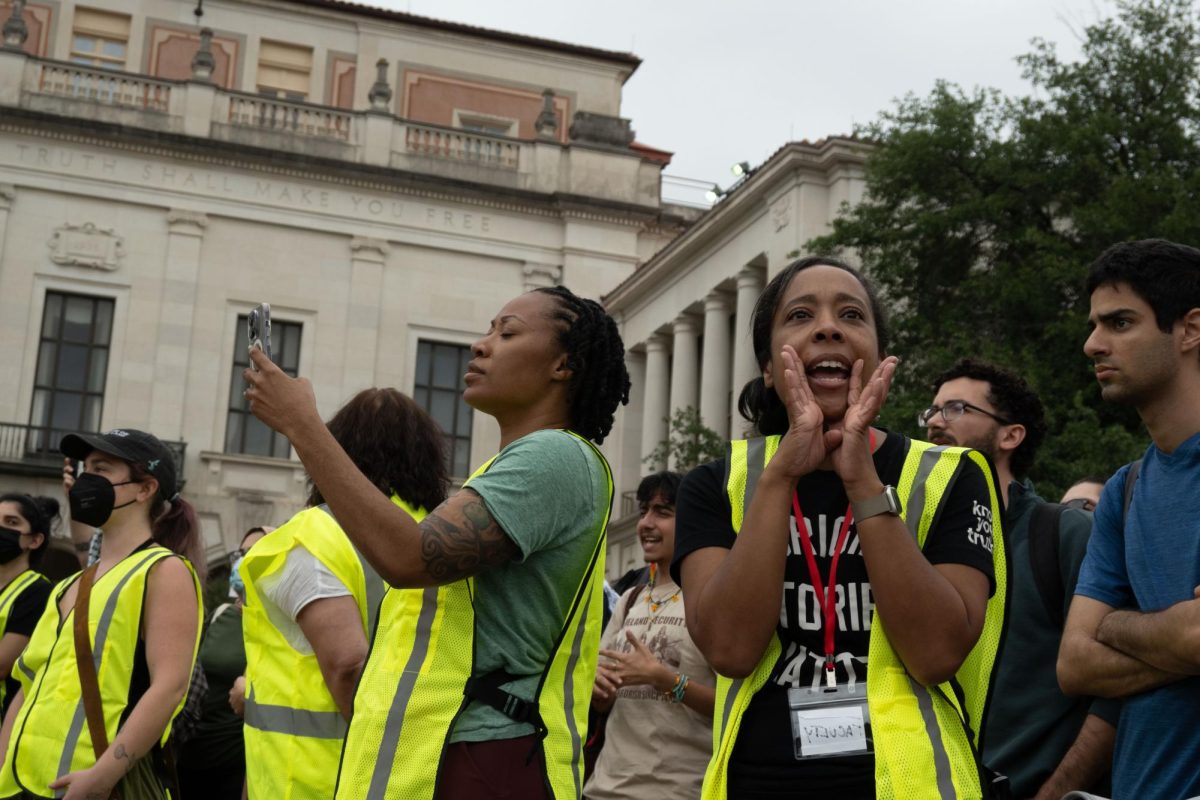This past summer, a freshman’s orientation experience was different than he expected. The expanse of the campus, the swiftness of orientation activities and the abundance of fellow incoming freshmen momentarily dashed his expectations of developing a sense of community.
“One of the nights of orientation, I was just wandering around and looking for what I was supposed to do next,” said the freshman communications student, who asked to remain anonymous due to safety concerns. “Somebody in Jester (Center) walked up to me and asked if I was lost.”
He said the person who approached kindly provided directions and invited him to a University-affiliated Christian organization’s upcoming ice cream social. The freshman agreed, appreciating the assistance and invitation.
“Everybody seemed really nice,” he said. “I think the thing that drew me into the group is that I had felt pretty lonely or isolated at UT up until that point.”
He said that the group quickly immersed him in their community — messaging him daily and inviting him to their Bible study sessions, which continued even after returning home from orientation to prepare for his move to the University in the fall.
“Every night for the last couple of weeks with my family at home, I was spending not with my family, but with (the group) in Bible studies where they basically just told me what they believed for two to four hours,” he said.
Throughout these sessions, the freshman began to notice significant issues with the group’s operations and their asserted beliefs.
The freshman’s apprehension and discomfort with the group’s system and beliefs heightened with their efforts to discourage friendships outside the group and attendance of other religious institutions’ meetings and services.
“They said that because the early Church fathers were pointing to one specific church in a city, there should only be one church in a city,” he said.
In hours-long discussions, he said the group avoided his questions and concerns regarding the group’s behavior and non-aligning views with traditional Christianity.
“(Ultimately, they said) I should go with them to meet with one of their elders and talk to them about my questions,” the freshman student said.
Due to his discomfort with their suggestion and other issues he noticed, the freshman said he decided to leave and cut off contact with the group quietly. The group continued to reach out to him for the next few weeks, and they continued to do so when he arrived at the University, even asking to bring a housewarming gift to his dorm.
These attempts for contact continued for roughly two weeks.
“It felt like they were trying to coax me back in with promises of giving me stuff and asking me to go do stuff that wasn’t church-related with them,” he said. “If anything, it felt more like they were trying to extend the carrot on the stick to lead me back into the group.”
Biochemistry junior Allie said the group engaged in similar behavior after she attended an event roughly two years ago where the group’s staff members asked for personal information, including her name, number and address, to put in their phones.
“They asked to send me a package, which I thought they would send to my address, but they ended up delivering it, and they texted me, ‘Come downstairs and get it’’” said Allie, who asked to only be identified by her first name. She said the woman who delivered the package was a University alumna who had graduated years prior to attending the group’s full-time training.
“I felt pretty welcomed by the care package, so I would go to their bible study (and) meetings every Thursday,” Allie said. “They would do a few worship songs, have a message and then they would pray.”
While not mandatory, Allie said meeting attendance was strictly encouraged.
“Even if you were a perfect attendance member and didn’t go to (even) one meeting, they would get really upset,” Allie said. “I think it was part of the controlling aspect.”
Allie said the controlling efforts ranged from consistent messaging after a missed meeting, separation of male and female members, strict patriarchal governance and encouragement to only find community and relationships through the group and church.
Andrea McArdle, a photographer from Austin, grew up in her local church group, which was associated with the group at UT, and joined their student organizations associated with both the University of Houston and Austin Community College. McArdle said she left the church after finding out about a concealed instance of sexual misconduct and feeling a personal lack of support.
“I know more people than I (can) count on my fingers and toes that serve full time on college (campuses),” McArdle said. “That means their job is to go and have Bible studies with students, mostly freshmen, that they try to convert.”
The organizations operate on college campuses nationwide, their names varying and sometimes ever changing due to attempts to conceal allegations of spiritual misconduct and control.
“They’re there to recruit for the (larger church they’re affiliated with),” McArdle said.
Doug Duncan, a former Longhorn and a licensed professional counselor said groups like this have existed around the University for decades. He recalled the time an old friend nearly dropped out during his first year after coming into contact with a predatory religious organization.
“It is a fundamental tenet of evangelicalism to evangelize people, … but more manipulative groups also do this and try to (convert) people on campus or around town,” Duncan said. “They’re good at what they’re doing, which is finding vulnerable young people and enticing them into their groups.”
Duncan said maintaining humility during situations where members of groups approach you and seeking out information after the interactions is vital before joining or attending any of their meetings.
“Any legitimate church organization will give you their doctrinal statement,” Duncan said. “If (a group is) unethical, there’s (likely) gonna be people talking about them on discussion boards (online).”
For individuals who have left, or current members interested in leaving these groups, Duncan said a critical aspect to remember is not to feel shame over what happened.
“First of all, don’t beat yourself up,” Duncan said. “Realize that if they tried hard to recruit you, it’s probably because they saw value in you and wanted to recruit you to their cause because they realized that you were bright and idealistic.”
Next, he said everyone has to find their path in coming to terms with their experience and the aftermath, whether that is in the form of educating themselves by reading about the similar experiences of others, visiting the Counseling and Mental Health Center if necessary or sharing their experience.
Since his experience in the summer, the freshman student has spent time educating himself on the group he momentarily joined, reaching out to others with similar experiences.
“If you’re coming to a massive college campus and you are looking for community, just be aware that there are people out there who know (how) to exploit that,” he said.















